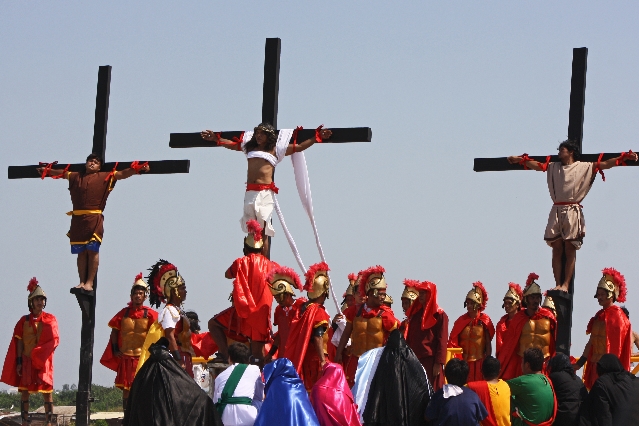Definition:
“Penitensya” is a Filipino term that refers to a practice within certain religious traditions, especially in the Philippines, where believers perform acts of self-punishment, self-mortification, or penance as a form of religious devotion and to express remorse for sins and seek forgiveness.
Etymology:
The term “penitensya” is derived from the Spanish word “penitencia,” which means penance. This reflects the historical influence of Spanish colonization on Filipino religious practices.
Description:
One of the most well-known forms of penitensya in the Philippines is the procession during Holy Week (Semana Santa), especially on Good Friday, before Easter. Holy Week (Semana Santa) is part of the Easter season in the Christian liturgical calendar. It is the final week of Lent, leading up to Easter Sunday, and commemorates the Passion, death, and resurrection of Jesus Christ. Some believers choose to undergo various forms of self-punishment, including flagellation (whipping), carrying a cross, crucifixion with or without nails, walking barefoot or in chains, and other intense practices as part of this penitential procession. The goal is to emulate or participate in the suffering of Jesus as a way to show penance and devotion.
It is a deeply rooted tradition influenced by the country’s Spanish colonial history and Catholic faith. Specific practices may vary by region, but the overall theme of penance and sacrifice remains consistent. Today, penitensya is observed by many devout Catholics in the Philippines as a personal and communal act of faith. While some of the more extreme practices have drawn criticism and concern from both religious and health authorities, they continue to be a significant part of Holy Week observances for many Filipinos.
During a Passion Play performed during Holy Week in Nova Hartz, in the state of Rio Grande do Sul, Brazil, on March 30th, 2018, when a Roman soldier stabs Jesus as he hangs on the cross, a man runs up on stage and punches the actor playing the Roman soldier in the head with what looks to be a motorcycle helmet. This incident is a good illustration of how detached from what’s actually happening a religious person can become. Click to watch the video.

Symbolism:
Penitensya is meant to symbolize atonement, repentance, sacrifice, devotion, and spiritual cleansing. To someone who is not religious, Penitensya may symbolize the dangers of religion, specifically how religion can cause people to commit self-harm.
Religion:
Penitensya is not explicitly described in major religious texts such as the Bible. However, it is rooted in the broader Christian tradition of penance and self-sacrifice, drawing inspiration from the Passion of Christ. The concept of penance and repentance is a significant theme in the Bible, with numerous references to acts of atonement and seeking forgiveness.
Repentance and Forgiveness:
- In the Bible, in Isaiah, chapter 55, verse 7 (NIV), it says: “Let the wicked forsake their ways and the unrighteous their thoughts. Let them turn to the Lord, and he will have mercy on them, and to our God, for he will freely pardon.”
- In the Bible, in Acts, chapter 3, verse 19 (NIV), it says: “Repent, then, and turn to God, so that your sins may be wiped out, that times of refreshing may come from the Lord.”
- In the Bible, in 2 Chronicles, chapter 7, verse 14 (NIV), it says: “If my people, who are called by my name, will humble themselves and pray and seek my face and turn from their wicked ways, then I will hear from heaven, and I will forgive their sin and will heal their land.”
Atonement and Sacrifice:
- In the Bible, in Leviticus, chapter 16, verse 30 (NIV), it says: “Because on this day atonement will be made for you, to cleanse you. Then, before the Lord, you will be clean from all your sins.”
- In the Bible, in Hebrews, chapter 9, verse 22 (NIV), it says: “In fact, the law requires that nearly everything be cleansed with blood, and without the shedding of blood there is no forgiveness.”
Self-Sacrifice and Following Christ’s Example:
- In the Bible, in Luke, chapter 9, verses 23-24 (NIV), it says: “Then he said to them all: ‘Whoever wants to be my disciple must deny themselves and take up their cross daily and follow me. For whoever wants to save their life will lose it, but whoever loses their life for me will save it.'”
- In the Bible, in Romans, chapter 12, verse 1 (NIV), it says: “Therefore, I urge you, brothers and sisters, in view of God’s mercy, to offer your bodies as a living sacrifice, holy and pleasing to God—this is your true and proper worship.”
- In the Bible, in Philippians, chapter 3, verse 10 (NIV), it says: “I want to know Christ—yes, to know the power of his resurrection and participation in his sufferings, becoming like him in his death.”
